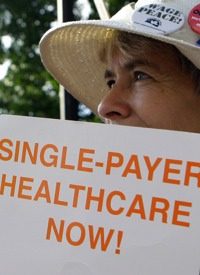
What a bizarre place I work in. Despite overwhelming public opposition by Californians to a government-mandated scheme that has failed in every country in which it was attempted, single-payer healthcare has been revived — strictly along party lines — in the California Legislature with the introduction of SB 810. (SB 810 passed off the Senate Floor today.)
Mere hours after the shocking election of Scott Brown in Massachusetts, Democrats who control the State Legislature in California revived their own universal health care bill. Didn’t they get the message I did?
I do not support socialized, government-controlled medicine because I believe that patients come before bureaucrats. True healthcare reform should be based on four fundamental principles: affordability, access, safety, and choice. Single-payer fails on every account.
Californians deserve a better standard of care.
Affordability
The nonpartisan Legislative Analyst’s Office (LAO) examined the California single-payer proposal that has been repeatedly introduced. What is the price tag that all California taxpayers will get stuck with? According to the LAO report — it’s $200 billion. That’s more than $5,000 in new taxes for every man, woman, and child in California today.
I cannot support an under-funded program that would leave patients with far fewer options for care than they have today … and $200 billion in new taxes for struggling Californians.
Access
The consequences of single-payer coverage are predictable and unacceptable, particularly for those with the most urgent health needs.
Wait times for patients with invasive breast cancer and other serious conditions are unacceptably long under Canada’s single-payer system, for example. Diagnosis and treatment delay are reflected in both the breast cancer screening rates and survival for Canadian women, which are lower than those of women in the United States.
As the result of Canadian government rationing of technology and resources, some provinces send patients to the United States for heart surgery and high-risk neonatal care.
Canadians, fed up with paying for access to long waiting lists rather than care, are scrambling to privatize their single-payer system. North Korea has the only other single-payer system in the world; all other nations have converted to a multi-tiered system.
This destruction of access to quality care is recognized within the retread bill, itself. The author has carefully exempted all state workers and labor union members from the restrictions imposed by the bill he introduced.
Safety
Studies examining the quality of care in countries with socialized healthcare reveal the universal need to eventually cut costs by rationing care. Patients suffer under a system that requires rationing (i.e., denial) of advanced technology and medical resources.
Choice
Single-payer schemes mandate a government-run system of healthcare delivery and destroy private markets and competition. Healthcare innovation and new technology are driven by private initiative, not governmental bureaucracy.
I cannot sacrifice medical innovation while our patients look to research for treatment options for devastating conditions like Alzheimer’s disease.
It is frustrating for physicians to have to deal with insurance company regulations, but nothing compared to the frustration of physicians dealing with complex governmental regulations, rationed care, and decreasing reimbursement rates. The evidence is clear in the diminishing number of physicians who accept Medicare and Medi-Cal patients. Unable to function efficiently to lessen administrative burdens, government-controlled medicine simply shifts them to doctors, hospitals, and other providers.
Bureaucratic imposition under a government-mandated regulatory scheme will inevitably increase for those who care for patients, not decrease.
The way to achieve real healthcare reform is to work at improving affordability, access, safety, and choice in the present system, not to discard both the good and the bad in favor of a single-payer system that will compromise the standard of care for Californians.
I have been a healthcare provider for over 30 years, continuing to practice while serving in the State Legislature the past 11 years. I continue to work for real solutions to the problems we face in healthcare delivery and funding.
Senator Aanestad, an oral surgeon, represents the 4th Senate District and is a member of the California Senate Health Committee.



